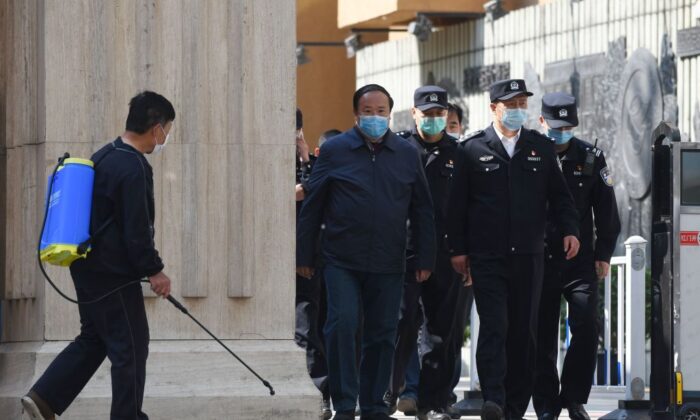Gordon Chang: On the Hong Kong Security Law, the India China Standoff, and Banning TikTok
Officials in Beijing knew that the CCP virus, commonly known as the novel coronavirus, was spreading among people by late December of last year but chose not to publicly announce the risk of human-to-human transmission until weeks later, a newly released scientific paper reveals.
Three researchers, including two from the School of Medicine at Washington University in St. Louis, revealed their findings in a preprint study, drawing their data mostly from the Chinese government and media reports. They concluded that Beijing delayed for at least three weeks before deciding to publicly acknowledge that the virus was contagious on Jan. 20.
“There had been convincing evidence of human-to-human transmission, including clinical presentation of patient clusters and viral sequencing results,” the researchers wrote in their paper, which hasn’t been peer-reviewed.
The initial patient clusters included an elderly couple who were admitted to Xinhua Hospital in Wuhan on Dec. 27, 2019, because of fever and a cough, according to a news report that was reposted on the official website of the Hubei provincial health commission (Wuhan is the capital of Hubei). The couple and their son were subjected to computerized tomography (CT) scans, and all three exhibited similar signs that were different from typical pneumonia.
“This family cluster demonstrated an obvious clue of ‘human-to-human transmission,’” the researchers stated.
A doctor overseeing the family’s case reported the CT scan results to hospital leadership. Two days later, on Dec. 29, Xia Wenguang, vice president of the Xinhua Hospital, reported to the city and provincial health commissions and Centers for Disease Control a total of seven similar cases, including the elderly couple and their son.
Another cluster involved a mother and her son, which were among four similar cases of pneumonia reported by the Wuhan Central Hospital to local health authorities on Dec. 29, the research paper stated, citing a Chinese media report. The researchers stated that the mother-and-son case was “another example of human-to-human transmission.”
One day later, on Dec. 30, an unidentified female physician at Xinhua Hospital reported symptoms of pneumonia, according to the researchers, without citing a source.
The researchers also reviewed early genetic sequencing of the virus.
On Dec. 27, Vision Medicals, a company based in southern China’s Guangzhou city, reported to Wuhan Central Hospital that its genetic sequencing of an unidentified patient at the hospital revealed a “SARS-like” coronavirus.
The SARS pandemic in 2002 and 2003 infected 2,769 and killed 425 people outside of mainland China, according to data from the World Health Organization (WHO). Experts say the numbers inside China are likely much higher than officially reported.
After a genetics sequential study was conducted by Beijing CapitalBio MedLab on samples from a patient surnamed Chen at the Wuhan Central Hospital, the lab determined the virus to be “highly suspicious for SARS” on Dec. 30, 2019, according to the paper.
On Jan. 11, the Wuhan Health Commission reported on its website that it had “not found clear evidence of human-to-human transmission” of the virus.
The researchers also calculated the virus’s reproduction number (R0, pronounced R naught) during the initial outbreak in Wuhan based on data from other scientific papers, media reports, and Chinese authorities from Dec. 1 to Jan. 8. They estimated that the R0 was 3.12.
In other words, each infected individual was passing the virus to 3.12 people on average. By comparison, the seasonal flu has an R0 of about 1.3, while the measles, a very contagious disease, has an R0 of higher than 12.
On Jan. 23, the WHO wrote that the human-to-human transmission rate (R0) in China was estimated to be between 1.4 and 2.5.
Using their estimated R0 and other variables, including an approximate incubation duration of 5.2 days for the virus (calculated based on the first confirmed cases in Wuhan), the researchers estimated that there were 239,875 infected people in Wuhan on Jan. 23, the day that city authorities placed Wuhan on lockdown.
The researchers argue that if Chinese authorities had imposed measures to stop the spread of the virus as early as Jan. 2, the number of infected people might have been dramatically decreased to 10,989 from 239,875.
“Without the three-week delay, the largest public health crisis of this century could have been avoided or controlled to a much greater degree,” the researchers conclude.
Focus News: New Study Reveals Beijing’s Coverup About CCP Virus’s Transmissibility
US Warns Americans in China of ‘Heightened Risk’ of Arbitrary Detention, Exit Bans
